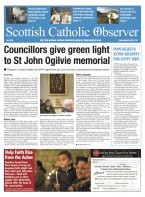March 3 | ![]() 0 COMMENTS
0 COMMENTS ![]() print
print

Not enough hours in the day? Or just too much to fit in?
EMILY MURTAGH takes time to reflect
I can’t sleep. 2am and we can’t sleep. 2am and the newsfeed is still scrolling and it’s five hours till the alarm will ring, and we can’t sleep. Do you ever feel like you are plugged into a life support machine at night, in a tangle of laptop and phone chargers, until you’re lulled into a blue-light-fuelled stupor, and wake up feeling a little less alive and a little more dead? Do you ever find yourself afraid to sleep, wanting to suck the last bit of potential out of today, a day you have a sinking feeling you haven’t quite accomplished enough in, so you can’t sleep?
As creatures given a wonderful and dangerous cocktail of body, soul and mind with which to live our lives, it is sure to say that God is deeply and wholly concerned with both our physical and our spiritual selves. This concern extends to both our physical and spiritual rest—the rest of our bodies, and the rest of our spirit in His presence. In a time where we worship the gods of busyness and the idols of industry, how can we begin to reflect on how we could rest a little better?
Let’s go on a Sabbath journey, a journey as much applicable to the everyday as to the given day of rest; to the rhythms in which we live, breathe, and—please God—sleep.
For the Jewish people, Friday was, and is, the day of preparation for the Sabbath. In order to enter into a place and time of rest, a certain amount of preparation was necessary, to extract any unnecessary work from the time of respite. Consider what it is that is eating into our rest time. Is it the things that we subconsciously don’t value quite as highly, but know that at some stage have to be done away with? (the necessary evils of being a fully functioning human). Meal preparation, homework, that molehill of emails, laundry, returning those library books, that old friend you promised in your Christmas card that you’d call, soon.
Procrastination makes rest an ever impossible destination, because the to-do list hangs perpetually half done, half circled in the red pen of guilt and shame. Close your eyes and sprint through it, if you can. If not, tear it up, for now.
When you have made some sort of peace with your to-do list, now is the time to stop. In some traditions, the Sabbath begins with the appearance of the first stars. Can we, like the Israelites, withdraw our focus from what is around us, and just look up?
Karl Barth called this the skylight moment. Our attention is taken from the windows of the world around us, which often lead us just to dwell on the rather messy reflection of ourselves that we find there. Our gaze is drawn upwards, look to the skylight, to the source of the light, the eternal creator, the perpetual glow. And there we find the guiding star—the lens through which we can view our world, and our situation anew.
William James, American psychologist and philosopher, wrote: “Attention implies withdrawal from some thing in order to deal effectively with others. It is the taking possession by the mind, in clear and vivid form, of one of what seem several simultaneously possible objects or trains of thoughts. Focalisation, concentration of consciousness, are of its essence.”
The psalmist captures the idea perfectly: “Turn my eyes from useless things, preserve my life according to your word” (Psalm 119:37).
In the conscious withdrawal from the often hectic rhythms of work, we bring our inner life into sharper focus, and have to ask ourselves the question, in Barth’s phrasing: “How is your heart?” How is the heart of those around you? With this question can come a certain sense of panic. What am I without my work and my ceaseless rhythm of task, task, task?
Some harder truths we need to sit with, to uncover what it is we’re afraid of, what insufficiency we think we are overcoming through living a life of overdoing. When we allow this space of contemplation, we give space for the Spirit of God to set our hearts at rest, to set our hearts to the rhythm of the spirit of God and, in that alignment, to feel a release from our dependencies, and ultimately to be filled. Be still and know.
Rest is a celebration of freedom, and freedom a gift of God and a characteristic of his goodness. In a recent conversation with friends around rest, an utterly perspective shifting thought was shared, inspired by Jefferson Bethke.
When God made the world, yes, it was on the seventh day that he rested after all he had done. But for Adam and Eve, the seventh day was their first full day on earth; they were ushered into creation to a day of entirely undeserved rest. The rest came before the work, as the night was created before the day. God loved us before anything we had accomplished.
Rest is a gift of a gracious God; to rest an act of Faith of a faithful people. It says that another hour will come, another hour to put our hand to the plough once more, that there will be enough to sustain our families, enough to reach out with love to those around us.
It sets us free from to-do lists we can never complete, colleagues and friends we can never compete with, gives us the freedom to be still, and to know, re-establishing our heart in a place where we can love and we can go. “Come to me, all who are weary and heavy burdened, and I will give you rest” (Matthew 11:28). He who promised is faithful. Blessed be your undeserved rest.
Pic: Andrew Branch











